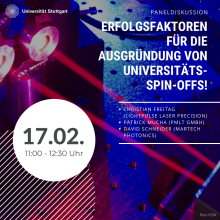After the introduction by Volkher Onuseit, the lecture series starts with a contribution by Christian Freitag, founder of Light Pulse Laser Precision. His journey of laser application areas began during his doctorate at the Institute for Jet Tools. Freitag reports how he was able to research different processes in the course of this and how first projects in the research environment already resulted in first network contacts, which later also led to first customers.
Today, he is particularly struck by the fact that technically complex expertise is made relatively easily accessible through work in the research environment. The relevant step for him afterwards, he says, is the leap into the sales world. "Don't underestimate your own value!" Especially as an engineer, this step is usually underestimated and one's own service and expertise are marketed too cheaply.
Christian Freitag's tip for sustainable success: "You have to get out into the world!" to tell people what you do. Only in such a way people can be inspired whether customers or partners, also for what you do.
Patrick Mucha, the founder of PMLT Laser, then had his say. As another person who earned his doctorate at IFSW, Mucha initially pursued a different path. At the time, the spin-off was based on a permanent position with his first employer. Due to the high level of support from the latter, the employer even became Mucha's long-term customer. For him, goal-oriented development is the key to success. His ideas come from inquiries. He often observes that many founders from the scientific environment have a strongly subjective and euphemistic perception of their product. In doing so, they often lose sight of the real problem of the customers, says Mucha.
"How much is it worth to the customer to get the problem solved?" According to Alexander Brem, this is a question every founder should ask himself.
With Martin Rumpel and David Schneider, two people from MarTec entered the virtual podium. MarTec was created as a direct spin-off of the IFSW. For Martin Rumpel, this was one of the most important success factors at the beginning. Many projects with industrial partners and EU cooperation partners resulted from the cooperation with research institutions. For him, it was important to find the jumping-off point afterwards: "You have to get out of research thinking and into marketability." This motivation led him to bring on board David Schneider, who has further expertise from the business environment. For him, this is one of the most important success factors that have a lasting impact: Networking and team building to complement and expand one's own expertise.
Following these three insights, a discussion arose between the participants and the audience. One of the biggest success factors that emerged by consensus was the benefits from the research environment. Network partners, initial customers and the use of facilities and expert knowledge enable personal fixed costs to be kept low in the early stages. All participants agree on this. In addition, starting the thought process as early as possible from the customer's perspective also meets the common tenor. Concluding positive experience reports and the resulting findings on cooperation models from research institutions and spin-offs reinforce the further motivation to expand these structures.
Text: Marcel Scharmach
Contact

Melanie Minderjahn
Career Service - Inner Development, Public Relations


